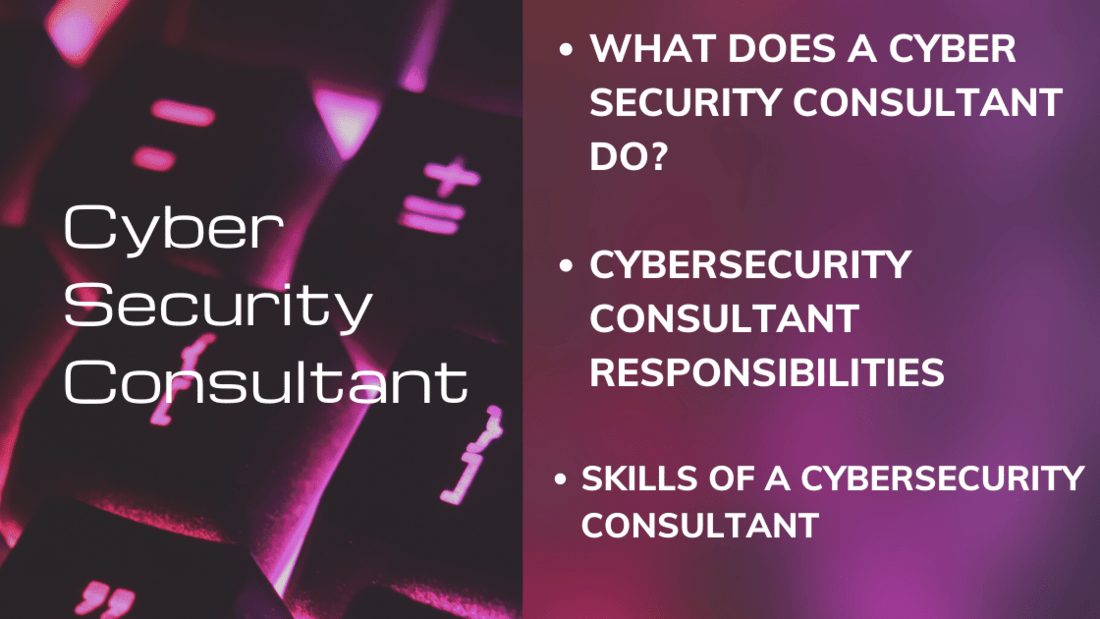What does a Cyber Security consultant do?
Today, cybersecurity consultants are in high demand. They safeguard sensitive information from cyber-attacks and hackers. Let’s look at their job description and the duties that come with it.
Who are Cyber Security Consultants, and what do they do?
We are in the midst of a rapidly evolving digital age. It is accompanied by details. From our social security numbers to our social media pages to our personal financial information, digital data is everywhere.
A cybersecurity contractor is in charge of safeguarding sensitive data produced by these various facets of the digital environment. They avoid security threats and cyber-attacks.
The threats to the protection of our data have increased as we become more dependent on technology, or rather as the role of technology becomes more active every day. As a result, there is a need for Cybersecurity Consultants that can assist companies in protecting their data from security threats.
Cybersecurity Consultant Responsibilities
Responsibilities of a Cybersecurity Consultant
Your job as a Cybersecurity Consultant entails data protection. This can be accessed in a variety of ways. The implementation of security policy for your client is the responsibility of security consultants.
If you work as a full-time consultant or freelancer, you’ll be interested in assessing cyber threats, identifying flaws in current security policies, and designing and implementing security solutions. Working on physical computer systems to protect them from cyber threats or malware is also an option.
What do a Cybersecurity Consultant’s duties entail?
- Creating effective strategies to safeguard the framework, networking infrastructure, data, and information systems from cyber threats.
- Threat detection, device checks, and security assessments are all done on a regular basis.
- Defining and updating cybersecurity validation criteria and procedures.
- Organizing discussions with other IT agencies in order to resolve safety issues.
- IT project teams estimate costs and categorize integration problems.
- Creating technical reports for the experiments that have been completed.
- Providing IT teams with expert advice and recommendations.
Are you in need of a Cybersecurity Consultant?
Look at the profiles of independent Cybersecurity Consultants.
Skills of a Cybersecurity Consultant
To be a good Cybersecurity Consultant, you must have knowledge of cloud technology, data, and network security, and building stable infrastructures, among other things.
Since there are new threats in cyberspace every day, having a passion for information and new learning is also important. Keeping up to date on related cybersecurity tools and technologies will significantly improve your ability set.
Global hackers and hacking threats have increased as the world moves toward a more global and interconnected approach. As a result, there is a global market for cybersecurity consultants, and you can find cybersecurity consultant jobs all over the world.
A Cybersecurity Consultant’s Must-Have Expertise
- Awareness of current threats, processes, and tactics
- Handling and Responding to Security Incidents
- Management of SIEM
- Compliance & Audit
- Intelligence & Analytics
- Skills in firewalls, intrusion detection systems, and intrusion prevention systems
- Encryption technology awareness
- Detection of Intruders
- Development of Application Security
- Malware Security at its Finest
- Control of APTs (Advanced persistent threats)
- Understanding of hazard modeling and coding techniques
- Management of Mobile Devices
- Data Management Security
- Forensics in the Digital Age
- Management of Identity and Access
- Awareness of ethical hacking
In addition to the more technical skills mentioned above, cybersecurity consultants will need excellent communication skills in order to communicate with clients and manage a security team. They must be constructive and capable of leading others.
Education and work experience are two of the most important aspects of a person’s background.
A bachelor’s degree in cybersecurity, information technology, or computer science is usually required to function as a Cybersecurity Consultant. In the field of information technology, certifications will help you build a stronger resume.
Here are a few industry-recognized cybersecurity credentials.
- CISM (Certified Information Security Manager) is an acronym for “certified information security manager.”
- CEH stands for “Certified Ethical Hacker.”
- CISSP (Certified Information Systems Security Professional) is an acronym for Certified Information Systems Security Professional.
- CompTIA Security+ is a certification offered by CompTIA.
Cybersecurity Analyst (CompTIA CySA+)
Cybersecurity consultants are supposed to have at least two to three years of prior work experience. There is no one-size-fits-all career direction, but here’s one that could work:
- Off as a junior position and progressing to Information Security Manager
- As a Security Administrator or Security Engineer, you will work your way up to a Senior position.
- Obtaining official certifications (for example, CompTIA Security+ and CEH)
- Start your career as a Cybersecurity Consultant.
Are you looking for a new position?
Projects for Cyber Security Consultants are available on a freelance basis.
Salary of a Cybersecurity Consultant
You should expect a decent salary as a Cybersecurity Consultant; on average, Cybersecurity Consultants start their careers with an annual salary of just over $51,000, rising to about $84,000 after a few years of experience and advanced skills.
A senior consultant’s annual salary will reach $149,000.










Leave a Reply